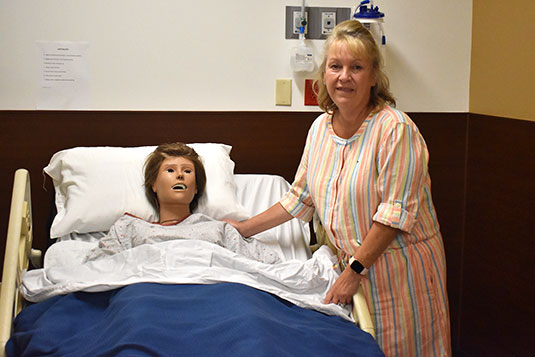In the fourth of our 8-part series, Dr. Kathleen Bauer, assistant teaching professor of the school of education, Ronald Pruett, housekeeping staff member, and Dr. Kathy Roseland, assistant professor of nursing, reflect on Sept. 11, 2001, remembering the 20-year anniversary of the infamous day.
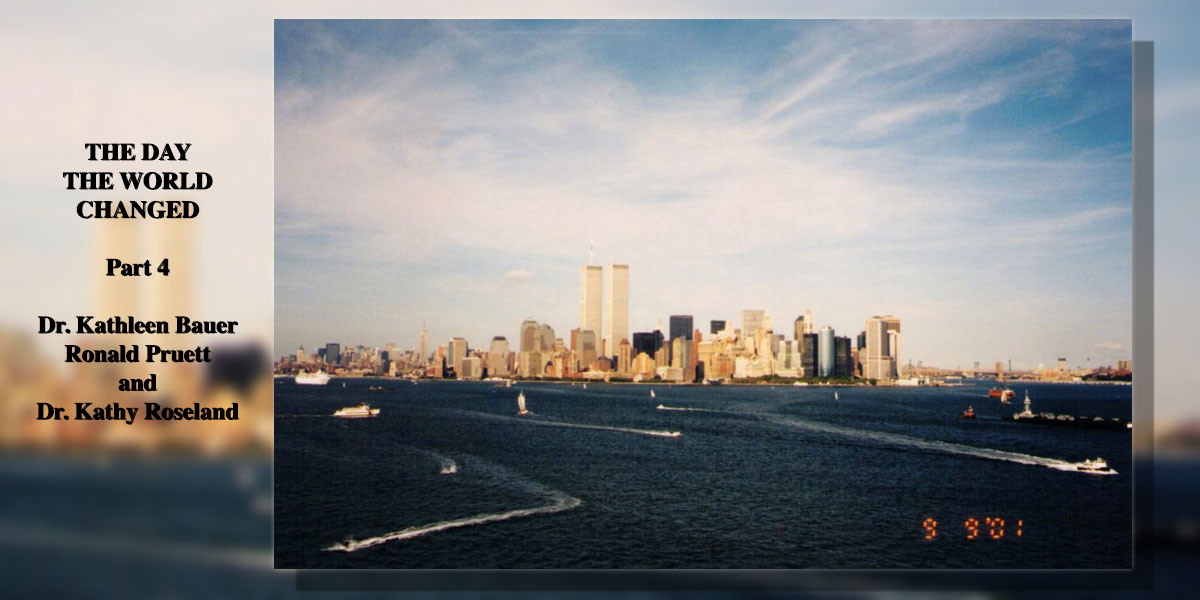 The North Tower and South Tower of the World Trade Center in New York City collapsed during the terrorist attacks on Sept. 11, 2001. This photo was captured by MBU’s Heather Goodin just two days before America was changed forever. Notice the date stamp in the bottom right corner as this photo was shot with film. Photo by Heather Goodin
The North Tower and South Tower of the World Trade Center in New York City collapsed during the terrorist attacks on Sept. 11, 2001. This photo was captured by MBU’s Heather Goodin just two days before America was changed forever. Notice the date stamp in the bottom right corner as this photo was shot with film. Photo by Heather Goodin
— Part 4 of an 8-Part Series —
This story was posted at 8:59 a.m. Central time
September 11, 2001 (all times Eastern Daylight Time)
8:46 a.m. – An airliner strikes the North Tower of the World Trade Center
9:03 a.m. – An airliner strikes the South Tower of the World Trade Center
9:37 a.m. – An airliner strikes the Pentagon in Washington, D.C.
9:59 a.m. – The South Tower collapses
10:07 a.m. – Flight 93 crashes in Shanksville, Pennsylvania
10:28 a.m. – The North Tower collapses
September 11, 2001, has a special place in the heart of every American. Many students at MBU were very young or not even born yet at the time of this infamous day. We can only learn about what happened during the terrorist attacks by hearing the stories of those who remember this time filled with fear, pain or even hope. MBU Timeline photojournalists asked our staff and faculty what they remember about Sept. 11, 2001, on its 20-year anniversary.
__________________________________________________
Dr. Kathleen Bauer
“Of course I thought about my family and wanted to make sure they were OK. And my dad, who was a man of few words, a Korean War vet, a banker in the business world, had retired, literally called my school to reach me through my secretary and my phone rang in the classroom. So you know when my dad, who has never called me at school or work in my whole life, right, called me, then I knew something was up. … He’s a bit of a history buff and he explained his take on the situation and that was that for that phone call.” “And then I called my husband to check in on him, and he said, ‘You know, I’m pretty sure David (their son who at that time was in elementary school near their home) and I saw this on a news report right before we walked him out the door to school.’ He said, ‘I’m on call to come get you if I need to or to go get David.’” “The world just became a little bit more somber that day, I think for all of us. And the residual of that is, in a kindergarten classroom, I had parents calling in like crazy making sure the school was safe, things were safe, of course safety is your priority when you’re an educator, when you’re anywhere right? So the residual effect that I speak of, days, weeks, months later, I think for the immediate impact, everybody in America got a little bit kinder.” “I liken that to flying home the day before the shutdown of the pandemic. Everybody was a little bit kinder, right? I see some parallels there. When we face crisis we dig deep and we find that kindness.” “Then I noticed a raised level of awareness for safety and intensity in my area of career, which was school teaching. Parents were all over the place, parents of the students that I taught in kindergarten: I do want them to talk about it, I don’t want them to talk about it. But the thing is in a kindergarten classroom, once one child has seen a little blurb in a news report, they start talking about it. So we had to, you know, reaffirm that we were all for America, that we were for peace on Earth and we didn’t know what tomorrow would bring, but we would do our best to walk toward it.”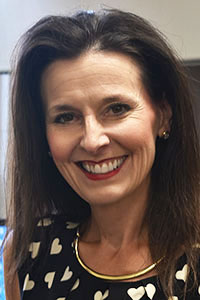
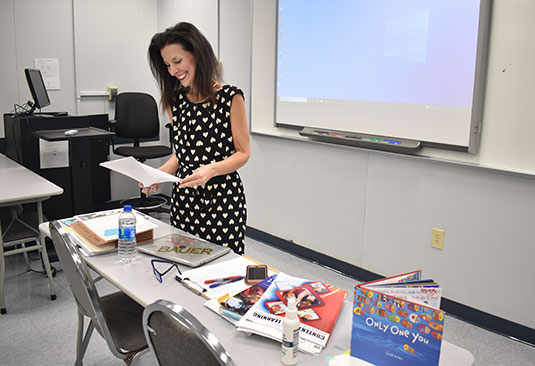
__________________________________________________
Ron Pruett
“My oldest daughter at the time was a toddler … I remember, I don’t know if it was that day or the next day or two right after that, when I went home and I just grabbed my daughter and I just clutched her.” “With the whole chain of events that day, it was just like, I just kinda felt like, ‘Is this just a bad dream? Well somebody pinch me and wake me up, like no, this didn’t really happen.’” “Where I worked at the time was out in Maryland Heights … and I was used to going outside to carry some trash out to the Dumpster. “Like with me, I served, I had served in the military prior to that. And … well … this is why I served … my thought was, ‘We can’t be defeated by this, we gotta take the bull by the horns and punish those who did this.’”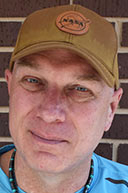
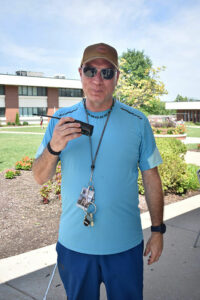 So you’d walk outside to the Dumpster and it was so weird for, and I can’t remember how long it was, but just looking up to the sky — there’s no planes up there. They shut down the airspace. I mean, nobody was flying. It was just the creepiest thing because, like, right there it was kinda in that direction, where we were was kinda in the flight path. They would fly over there to the airport.”
So you’d walk outside to the Dumpster and it was so weird for, and I can’t remember how long it was, but just looking up to the sky — there’s no planes up there. They shut down the airspace. I mean, nobody was flying. It was just the creepiest thing because, like, right there it was kinda in that direction, where we were was kinda in the flight path. They would fly over there to the airport.”
__________________________________________________
Dr. Kathy Roseland
“So as we were sitting there watching, Matt Lauer was talking and you could see a plane coming and it was all being shot live. You could see a plane coming and the next thing, the plane hit the tower. “So after that plane hit, we were just sitting there and there were no other calls that came into us, but then, in about an hour later, calls started coming into the ambulance service, like nationwide calls, because nobody knew what was going on, you know? And then we started getting reports like the Pentagon had been hit and there was another airplane that had been taken over in the one that crashed in Pennsylvania.” “So these calls were coming out to the local ambulance services to be on guard. So we were just like in this small town like, ‘Uh, what are we gonna have to do?’ We didn’t know what was going on. So … I just remember there was a whole lot of confusion.” “And the biggest thing is that my son was in the Marines at that time and he was stationed in North Carolina, on the base of North Carolina, and he had called and he said, ‘What is going on?’ And I said, ‘Well there, you know, the World Trade Center has been hit and the Pentagon has been hit.’ And they were asked to go outside of their base, Camp Lagoon. They were asked to go outside of their base and there, with their guns, protect the base. But they had no idea what was happening. “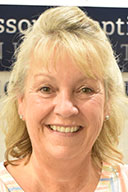 And we were like, ‘Oh my gosh another plane hit the tower.’ But I remember there was a lot of confusion and just trying to figure out what was going on.”
And we were like, ‘Oh my gosh another plane hit the tower.’ But I remember there was a lot of confusion and just trying to figure out what was going on.”